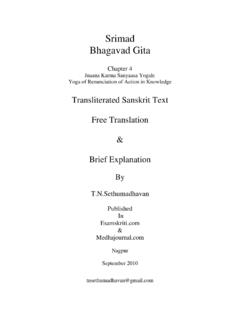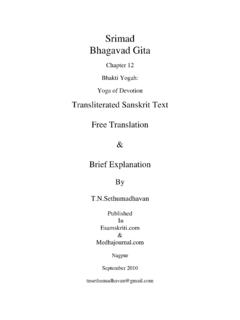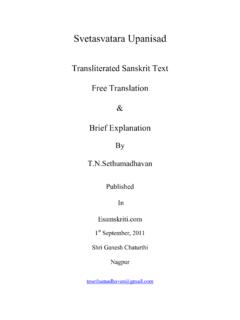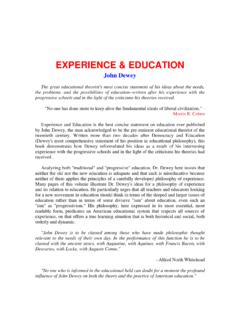Transcription of SRIMAD BHAGAVAD GITA - eSamskriti
1 SRIMAD BHAGAVAD Gita Introduction & Chapter 1 Arjuna Vishaada Yogah: Yoga of the Despondency of Arjuna Transliterated Sanskrit Text Free Translation & Brief Explanation By Published In & Nagpur September 2010 SRIMAD BHAGAVAD Gita Methodology of Presentation The radiance of the BHAGAVAD Gita is being brought to the readers under this column through the means of easy to handle tools. This arrangement consists of a series of essays covering the entire Gita in a simple, direct and interactive style employing the technique of a Distance Education Programme. The presentation of each Chapter of the Gita will have All transliterated Sanskrit Verses with a lucid translation and explanatory notes divided into different topics for a clear-cut grasp of the subject A brief account of the issues and concepts involved Strategies to put the ideas discussed into practice and A questionnaire for self-assessment by the reader The periodicity of posting these essays would be about once in a fortnight barring unforeseen circumstances.
2 In preparing these essays I have steered clear off all the scholastic debates and controversies with a view to reach out to the average modern educated young people who require the strength of the Gita to wade through the current day troubled waters. My purpose is just to help them to understand the essential message of the Gita so that they will blossom into integrated persons full of equanimity of mind, speech and action. Their needs in the context of our present habits of study were fully kept in view in this process. If this effort ignites the minds of the readers and prepares them to take a dip in the Gita Ganga on their own, the objective of my mission would be accomplished.
3 May Ganesha, The Lord of Wisdom, shower His grace on all of us in our voyage from darkness to light with the help of the BHAGAVAD Gita, the Essence of Knowledge itself? AUM asatoma satgamaya tamasoma jyotirgamaya mrityorma amritam gamaya om shantih , shantih, shantih >>>()()()<<< Introducing SRIMAD BHAGAVAD Gita: A User s Manual for Every Day Living Live in the world but don t be of the world. Live in the world but don t let the world live within you. Remember it is all a beautiful dream, because everything is changing and disappearing. If you become detached you will be able to see how people are attached to trivia and how much they are suffering. And you will laugh at yourself because you were also in the same boat before.
4 - Osho THE GITA S WIDE APPEAL The BHAGAVAD Gita was first translated into English by Charles Wilkins in 1785 and published by the British East India Company with an introduction by Lord Warren Hastings, the first British Governor-General of India, in which he prophetically wrote: The writers of the Indian philosophies will survive when the British Dominion in India shall long have ceased to exist, and when the sources which it yielded of wealth and power are lost to remembrance . He further wrote I hesitate not to pronounce the Gita s performance of great originality, of sublimity of conception, reasoning and diction almost unequalled and a single exception amongst all the known religions of mankind.
5 The Gita deals with human problems in a human way. That is why it has a tremendous appeal. It has inspired the human mind in India for centuries and today it casts its spell on millions of people across the various parts of the world. It remains the most translated work in the Globe. The modern technology like the Internet has further increased its reputation by carrying its message to every nook and corner of the world. A mere click on the word BHAGAVAD Gita in the Google search engine throws about 963,000 results. An incredible reach for any scripture! Among the great and extraordinary people who were inspired and found their outlook changed by the timeless wisdom of the Gita are thinkers, writers, scientists and philosophers like Mahatma Gandhi, , Sri Aurobindo, Albert Einstein, Dr.
6 Albert Schweitzer, Herman Hesse, Ralph Waldo Emerson, Aldous Huxley, Walt Whitman, Henry David Thoreau, Annie Besant, Robert Oppenheimer Sir Edwin Arnold and Carlyle to name but a few. In India it was left to Adi Sankara who lived in the 8th century to reveal the greatness of the Gita to the world. He retrieved it from the mighty tomes of the epic, the Mahabharata, and wrote a brilliant commentary on it. It is this commentary which prevails as a classic text even today. Later great acharyas like Ramanuja, Madhva, Vallabha and others came out with their own commentaries which are popular among their followers. In modern times Sant Jnanesvar, , Aurobindo contributed their original thinking on the text.
7 Despite this enormous popularity, the BHAGAVAD Gita remains a less understood but a better known text; people know more about it than what is it about. On the analogy of what the BHAGAVAD Gita says in Chapter 2, Verse 29 some look upon the book as marvelous, a scripture of extraordinary or mysterious value, some others speak of the book as wonderful. And still others though hearing its teachings do not comprehend its wonderful significance! Bhagavan Sri Krishna also says in the Gita ( ) Among thousands of men , one by chance aspires for perfection; even among those successful aspirants only one by chance knows Me in essence. A question arises why such enlightened persons are so rare in our midst and why such an achievement is not within the reach of everyone.
8 Vedanta being a subjective science rarely one tries to know how to remove one's weaknesses and develop inner strength much less one tries to live up to the ideals propounded by it and bring about consequent re-adjustments in one's life. Very few feel this urge to evolve themselves and most of us do not even find the need for self improvement. We grope along by the voice of tradition, authority, herd-instinct and group-mentality. Of those who strive to see the truth and reach the goal, only a few succeed. Of those who gain the sight, not even one learns to live by the sight. No wonder once a teacher wanting to educate a child about the Gita asked him Do you know Gita ?
9 The child replied Yes, I know, that is the name of my next door aunty . The child obviously heard of Gita and had his own meaning of it in his mind and remained happy about it. That is the case with most of us today including the large mass of modern educated sections. Then where do we go from here? Again, the Gita says by constant learning and practice one can certainly improve oneself. Let us attempt to heed that advice through this series of essays. WHAT IS THE GITA? The dictionary meaning of the word Gita is a song or poem containing an inspired doctrine and the word Bhagavat means a blessed or adorable or venerable or divine One. Hence SRIMAD BHAGAVAD Gita is variously called as The Song of God , The Divine Song , A Song of Fortune , The Lord s Song , The Holy Song of God , The Song of the Lord , Gudartha Deepika, Gita Rahasya, Jnaneshwari, Bhavaarthadipika, Sadhaka Sanjeevani and so on.
10 The noted English poet, journalist and a Principal of the Government Sanskrit College at Pune, Sir Edwin Arnold (1832-1904) called his famous poetic version of the BHAGAVAD Gita as The Song Celestial . The BHAGAVAD Gita s another title is moksha sastra or Scripture of Liberation . However, it is more popularly known as The Gita . The BHAGAVAD Gita is a sacred Hindu scripture, considered among the most important texts in the history of literature and philosophy. It finds a place in the Bhishma Parva of the Mahabharata. It comprises of 18 chapters spread out in 700 verses. Its author is Veda Vyasa, the compiler of the Mahabharata who wrote this epic through the hands of the Lord of Wisdom, Sri Ganesha.












